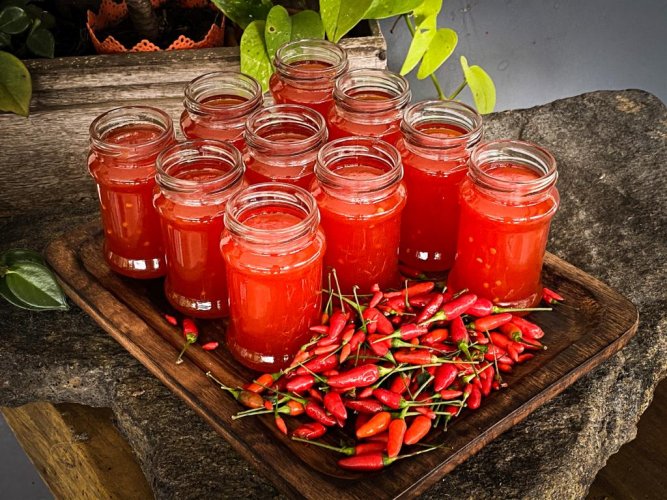
For Pandanda Shyla Naresh, a teacher in Kodagu, the past five months have been a learning period. Jackfruit, banana and bamboo plants in her farm offer ample opportunity for experiential learning. Lessons in value-addition have helped her utilise produce in the best way possible.
What started as an experiment in March after the uncertainty of the Covid-19 pandemic has now become a steady source of income. “All the three products I prepare – tender jackfruit, banana stem and bamboo shoot steeped in brine (salt solution) – are in good demand. I have sold 400 bottles of tender jackfruit and 300 bottles of banana stem in brine so far,” says Shyla. Ajjikuttira Pallavi Girish, who works as a non-teaching staff in a private college, has also taken up this activity.
These processed foods, prepared without artificial ingredients, are used in a variety of dishes, from pickles to cutlets and curries.
Fancy Ganapathy, who leads an initiative called ‘Kodagu’s Nature’s Best Food Cluster’, a subsidiary of Madikeri and Virajpet taluk Savayava Krishi Sahakari Niyamitha, supported the duo by providing technology and marketing; the forum that Fancy leads strives to encourage women entrepreneurs to make products using locally available fruits, spices and other produce. The women are supported at all stages – whether it is ideation, marketing or assistance in using technology to process the food.
During the lockdown, Fancy’s team saw more people joining the group, the members increased from 110 to 160; their product range also expanded, with the new members bringing in fresh ideas and new recipes. In all, the team boasts over 70 products, ranging from a variety of pickles and jams to oils and vegetables in brine. As many as 50 families took up an alternative livelihood with support from this forum.
With their main customers, the homestays in Kodagu closed during Covid-19, the team chose to go the route of online marketing. “We placed our products on online platforms and the sales have increased significantly as homemade products are trending. Now we are confident of marketing any number of products,” says Fancy. Natural ingredients, localised production (homemade) and a focus on quality have kept them in good stead.
Other women entrepreneurs have come up with unique product ideas as well. Take the case of Archana Muttanna from Kadanga village near Virajpet. She holds a doctorate in biotechnology and has been standardising various traditional products, particularly different types of fruit vinegar that are integral to Kodagu’s cuisine. Kachampuli vinegar or the concentrated juice of Garcinia gummi-gutta, which is sought after for its health benefits, is one of the main products she has been producing for the past one year.
With her production unit shut during the lockdown, Archana spent the free time researching various other products. On a friend’s suggestion, she made jams of the passion fruit, which is available in abundance locally; she then gave the fruit spread a unique twist by adding millets to the recipe.
Eco-crafts
Another woman entrepreneur who benefited from online marketing is Kusuma Hegde, in Uttara Kannada district.
She designs craft and utility items and ornaments from areca sheath, banana fibre, bamboo, and vegetable seeds. What started as a passion 15 years ago has become a source of subsidiary income for her family and provided employment to fellow villagers, mainly women.
Her objective was to transform agriculture waste and locally available raw material into works of art. In her journey from an art enthusiast to a crafts entrepreneur, she has created innovative designs like the areca cap, banana fibre folders and vegetable seed ornaments. Latest addition to her work are the unique rudrakshi pendants made using the rudrakshi fruit grown in their farm. She has expanded the scope of the handicraft production unit by setting up a laser engraving machine that helps her carve and etch designs.
Kusuma has also motivated and trained other rural women to take up value addition by forming Sahyadri eco-friendly solutions. Some college students have also spent their holidays at the workshop, learning on the job and using the money earned to pay their college fee.
However, Kusuma says she was inconvenienced when it came to marketing her products at various forums. “I mostly used to sell the product through homestays, tourist places and some outlets in Bengaluru and Mysuru,” Kusuma says. All her marketing avenues closed when the lockdown began and she had to stop production for a while.
Gradually, she noticed homemade food products being sold on online platforms and decided to try her luck. “I joined some social media platforms and started sharing my work and products and the response was amazing,” she says.
More than the seamless marketing, she prefers these platforms for the sheer joy of knowing the customers and getting their feedback. “Direct marketing has many benefits, especially when you create customised products,” she says.
In these uncertain times, these women from rural areas, from teachers to doctorate holders, have found ways to cope with the difficulties and support each other.
source: http://www.deccanherald.com / Deccan Herald / Home> Spectrum> Spectrum Statescan / by Anitha Pailoor / Bengaluru – September 11th, 2020


Hi I had the opportunity of tasting some very good Mulberry jam recently that was being sold in my complex recently in Bangalore .
I went through your website and it sounds very interesting . If you can send me a list of products then I would like to see and try a few myself .thank you